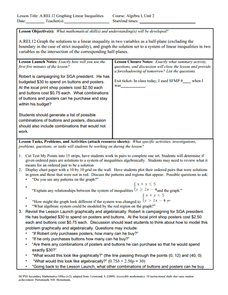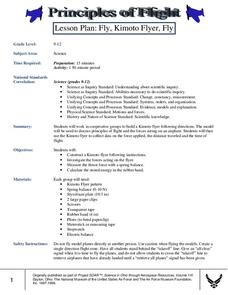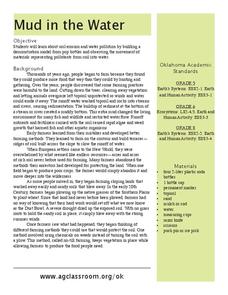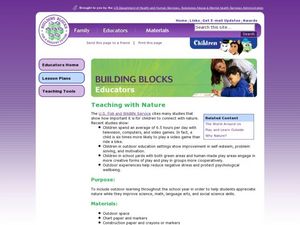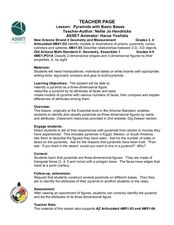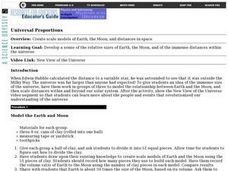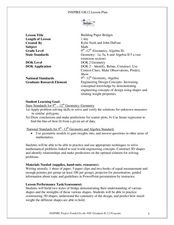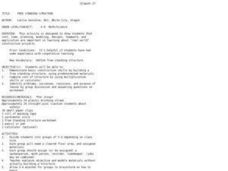Curated OER
Landmark Restoration Project-Scale Model Measurements
Learners work in cooperative groups to find the actual measurements of an historical building/landmark. Then they use ratio and proportion to figure the measurements that might be used to create a scale model of the structure.
Institute of Electrical and Electronics Engineers
Pollution Patrol
Students design and build an outdoor air pollution detector, test their designs, and communicate their results. In this investigative instructional activity students work in teams to design their detectors and use everyday items to do...
Curated OER
Spaghetti Bridges
Eighth graders experiment with building bridges of spaghetti, pennies, and a cup to determine how varying the number of spagetti pieces affects the strength of the bridge. They graph their results and interpret the data.
Curated OER
Working with Cuisenaire Rods In Mathematics
Fourth graders learn the numerical value of each underlined letter of the standard Rod Code and develop systematic usage for building new units.
Curated OER
Misleading Graphs Lesson Plan
Students design and build water balloon catchers from random scrap materials, while taking into consideration a multitude of variables including: cost, maintenance, total capacity, etc.
Curated OER
Thinking Like An Engineer
High schoolers explore physics. They investigate the strategies used by an engineer to solve a problem. Students construct various models to solve the problem. They display their solutions and explain how they solved the problem.
Curated OER
Graphing Linear Inequalities
Eighth graders extend skills for representing and solving linear equations to linear inequalities. Lesson activities build understanding and skill by plotting ordered pairs of numbers that either satisfy or do not satisfy a given...
Curated OER
Two-Dimensional and Three-Dimensional Shapes
First graders explore 2-dimensional and 3-dimensional shapes. In this geometry instructional activity, 1st graders examine the attributes of 2 -dimensional and 3-dimensional shapes. They also create the shapes as they build models. This...
Curated OER
What Type of Snow Makes a Good Snowman
Students attempt to build a snowman. For this comparison lesson, students divide into groups, are given different types of snow (dry and wet) and try to make a snowman. Students discuss and record the characteristics of the snow and if...
Curated OER
Principles of Flight
High schoolers explore the principles of flight. In this flight activity, students construct a model plane and investigate the forces acting on the flier. They will measure the thrust and calculate the stored energy.
Curated OER
Mud in the Water
Sixth graders investigate erosion. In this erosion activity, 6th graders explore how farming changes the environment. Students construct an erosion model and research ways to protect the soil from excess mud generated by farming.
Curated OER
Teaching with Nature
Students participate in a nature walk to learn about their natural environments. In this nature study lesson, students brainstorm a list of things to look for on their nature walk. Students go on the nature walk and locate objects they...
Curated OER
Pyramids with Basic Bases
Students explore pyramids. In this math lesson, students discuss where they have seen examples of pyramids. Students classify pyramids as three-dimensional figures and identify their attributes.
Alabama Learning Exchange
It's Around There Somewhere! Perimeter, and Circumference
Explore the concept of building equations for perimeter and circumference. Learners use rulers to measure the perimeter of half a sheet of paper. Then fold the sheet of paper numerous times, each time measuring perimeter. Learners use...
Curated OER
Volume of a Cylinder
Students predict the shape of a geometric figure in 3D. In this geometry lesson, students construct 3D shapes to perfect their knowledge of measuring and predicting. This assignment is also available as an online interactive lesson.
Curated OER
Universal Proportions: Earth and Moon
Young scholars create scale models of Earth, the Moon, and the distances within the universe. Working in groups, they construct their models of Earth and the Moon on a scale of 50:1 and calculate how far apart to place their models. ...
Curated OER
Pascal's Triangle
Students study Pascal's triangle. They construct their own version of Pascal's triangle, and relate some of the uses for it. While working through this process, students practice their integer multiplication and division skills.
Curated OER
Cube Coloring Problem
Upper elementary and middle schoolers describe the various features of unit cubes, such as edges, corners, and faces. They also discuss how to represent measurements of a cube using exponents before engaging in various thinking and...
Curated OER
Relating Algebra to Geometry
Learners investigate the connection that exists between Algebra and Geometry. They classify two and three-dimensional figures. Pupils use formulas to solve problems in geometry and use appropriate measuring devices in the right contexts.
Curated OER
Building Paper Bridges
Learners construct a bridge that can hold 100 pennies. In this math lesson, students evaluate the strength of their bridges. They predict how much weight a bridge can hold based on its design.
Curated OER
TRIANGULATEERS IN THE REAL WORLD
Students explore about triangles and the simple machines that are made from those triangles. They are able to identify the kinds of triangles in the machines, tell how the triangular shapes make the machines function, and build a simple...
Curated OER
Free Printables: Nets (3D Models)
In this 3D shapes worksheet, students cut out the 3D shape on the page and fold on the lines to create the correct shape. The worksheet states which shape should be build with the cut-out.
Curated OER
Free Standing Structure
Students demonstrate basic construction skills by building a free standing structure, using predetermined materials. They compute cost of structure by using multiplication skills or calculator.
Curated OER
Building a Ship Lesson Plan
Students draw a ship to scale, and calculate the real life size. They show that measurements on the drawingsare annotated with the distances reported in inches (fractions and decimals), and their real-world equivalents








